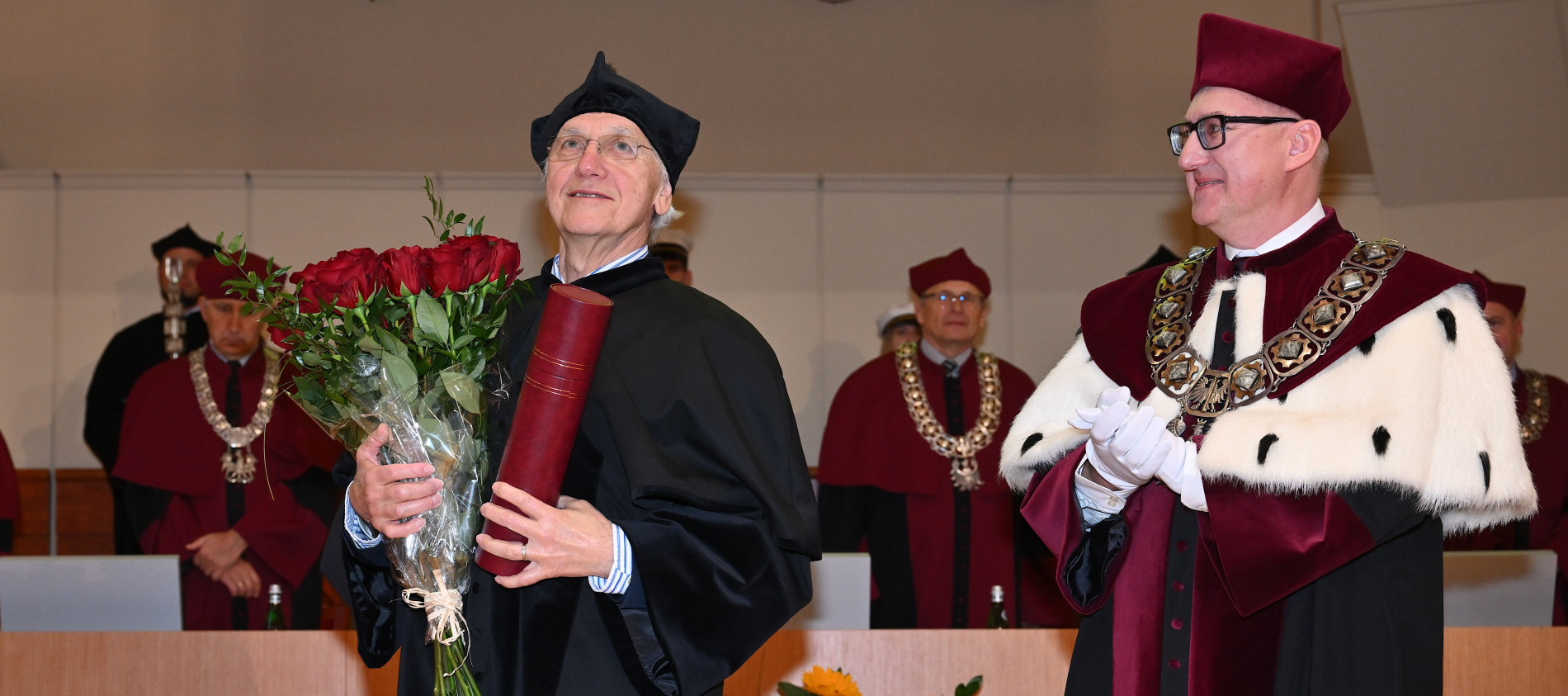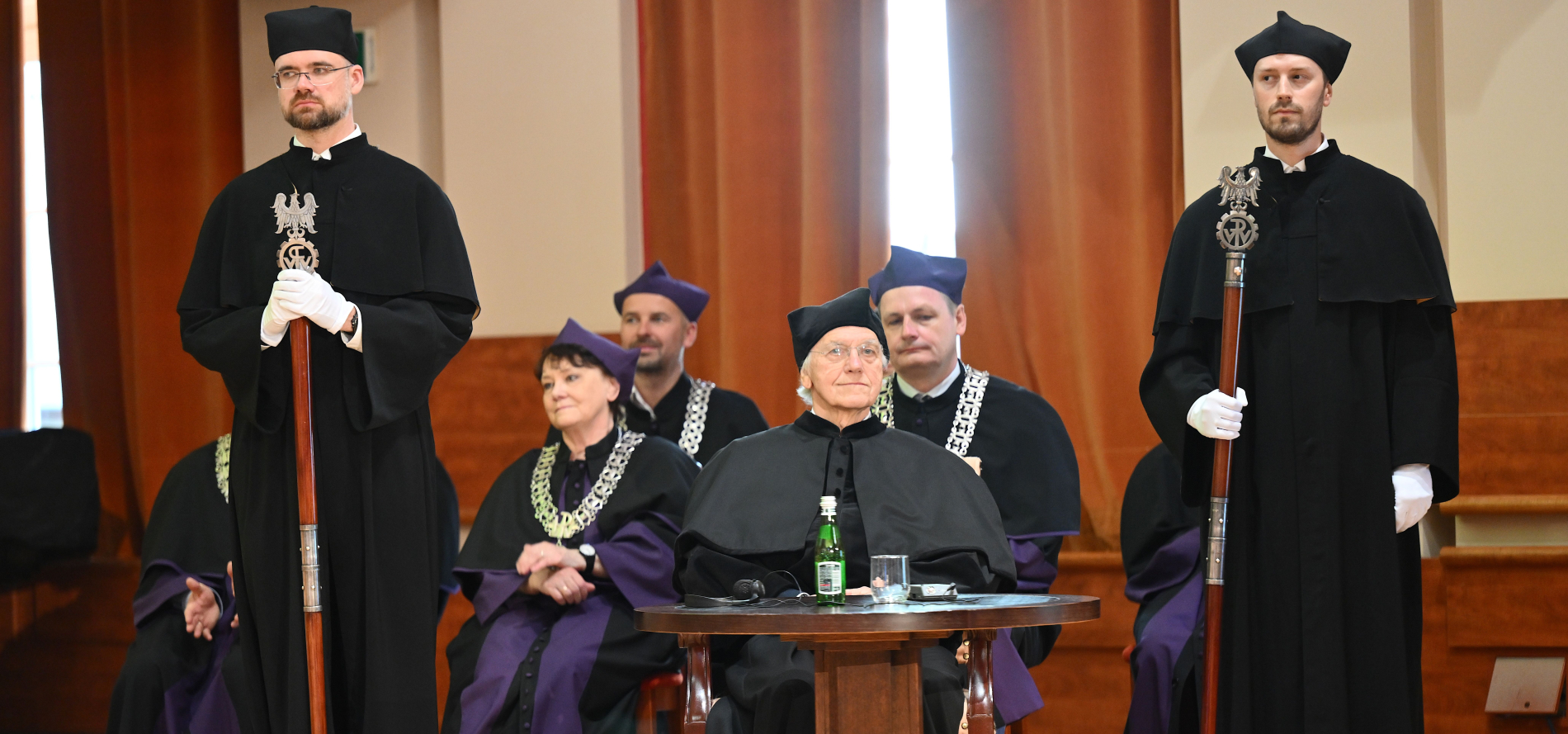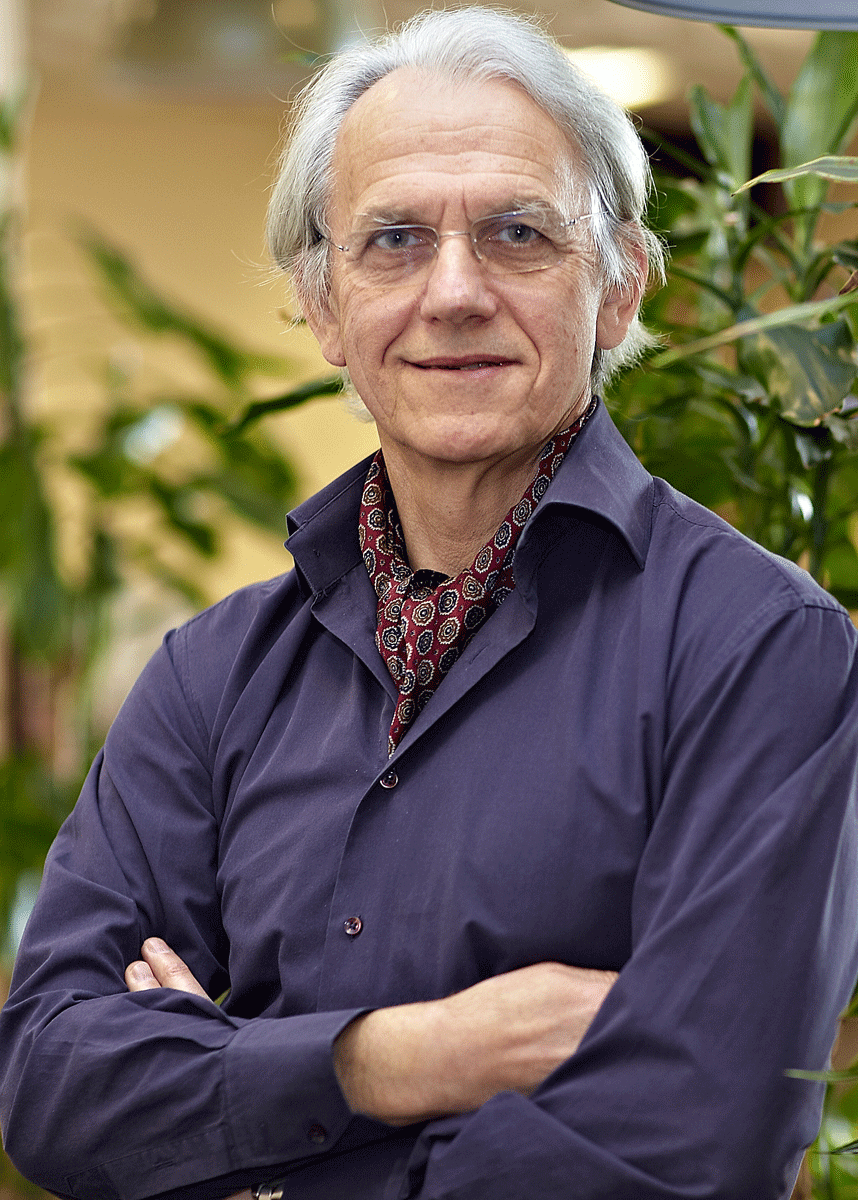YOUR BROWSER IS OUT-OF-DATE.
We have detected that you are using an outdated browser. Our service may not work properly for you. We recommend upgrading or switching to another browser.
Date: 15.05.2024 Category: general news

The eminent French physicist, initiator of the European Extreme Light Infrastructure (ELI) project and 2018 Nobel Prize winner has been awarded an honorary doctorate from our university. He received the award during a ceremony in the auditorium of the Wroclaw Tech.
The title of doctor honoris causa of Wrocław University of Science and Technology is in recognition of Prof. Gérard Mourou's outstanding achievements for world science, in particular for the development of a method for amplifying ultra-short optical laser pulses of extreme power (the so-called CPA technique - Chirped Pulse Amplification), for his visionary initiative of the European ELI investment and for his long-standing cooperation with the Polish scientific community.
The decision to confer the title was taken by the Wroclaw Tech Senate in September 2021, but the ceremony had to be postponed due to the coronavirus pandemic.
The promoter of the honorary doctorate was Professor Krzysztof Abramski from the Faculty of Electronics, Photonics and Microsystems.
- It is a great honour for me to be able to introduce Professor Gérard Mourou, an outstanding visionary scientist, a passionate scientist, whose achievements in amplifying ultra-short pulses of light have become a breakthrough not only in the development of physics and photonics, but also in medicine. They also improve the quality of life for everyone. For this achievement, he was honoured with the 2018 Nobel Prize, joining the ranks of outstanding Nobel laureates leading the development of physics and laser technology," - he said in his laudation.
Prof. Krzysztof Abramski stressed that without the techniques developed by Prof. Mourou and his doctoral student Donne Strickland, it is no longer possible to imagine progress, especially in the quantum physics of extreme intensities. The CPA method is revolutionising optics, opening up new fields such as attosecond pulse generation, non-linear quantum optics, compact particle accelerators.

- His work has had a huge impact on the development of ultrafast lasers, ultrafast electronics and so-called femtosecond ophthalmology, which involves using CPA for precision laser eye surgery - myopia correction and corneal transplants. Thanks to this technique, millions of such eye operations are performed worldwide every year, explains Prof. Krzysztof Abramski. - In turn, his publication record includes a remarkable history of collaboration with various research teams, where he inspired and co-implemented scientific and engineering ideas. His entire scientific life is a praise of teamwork, to which I would like to draw special attention in this laudation to the Polish scientific community, he added.
In 2005, Prof Gérard Mourou proposed the construction of a system of superlasers with extreme powers in Europe, enabling research into new materials with powers previously unattainable. A report presented in 2010 outlined the framework for the Extreme Light Infrastructure (ELI) initiative and proposed that the structure be built in Central and Eastern European countries. It is finally being built in three countries - the Czech Republic (ELI Beamlines), Hungary (ELI ALPS) and Romania (ELI-NP). Prof. Mourou is a patron and supporter of the ELI project, frequently visiting branches of this European scientific initiative.
- Eleven Polish scientific institutions, including two faculties of our university, have signed the 'ELI Poland' consortium agreement. Its task is to popularise the use of ELI infrastructure for collaboration and the creation of new original research ideas, explains Prof. Krzysztof Abramski. - In March and April this year, together with ELI, we organised a series of nine lectures for Polish students and doctoral students from various disciplines on research topics related to high-power pulsed lasers. Professor Mourou's lecture today is the culmination of this series," - he added.
- I am very moved by today's ceremony. I enjoy music very much and the performance of the university choir was wonderful. Receiving such an honourable award in the country of Nicolaus Copernicus is very important to me and for that I also wanted to thank you," - said Professor Gérard Mourou. - 'Poland has also played a very important role in the development of the ELI system, and although the structures are ultimately not built in the country, it remains very active in ongoing cooperation,' he added.
During the ceremony, Prof. Mourou gave a lecture entitled 'Passion for Extreme Light'.
 Prof Gerard Mourou was born in Albertville, France. He studied physics at the University of Grenoble and then at the Pierre-et-Marie-Curie University in Paris, where he obtained his PhD in 1973. In 1977, he became a professor at the University of Rochester in the USA, where, together with his PhD student Donna Strickland, he developed the CPA (Chirped Pulse Amplification) technique in 1983, which made it possible to amplify ultrashort laser pulses to very high optical powers. It was for his groundbreaking idea of CPA that Gérard Mourou received the 2018 Nobel Prize in Physics together with Donna Strickland.
Prof Gerard Mourou was born in Albertville, France. He studied physics at the University of Grenoble and then at the Pierre-et-Marie-Curie University in Paris, where he obtained his PhD in 1973. In 1977, he became a professor at the University of Rochester in the USA, where, together with his PhD student Donna Strickland, he developed the CPA (Chirped Pulse Amplification) technique in 1983, which made it possible to amplify ultrashort laser pulses to very high optical powers. It was for his groundbreaking idea of CPA that Gérard Mourou received the 2018 Nobel Prize in Physics together with Donna Strickland.
He is the initiator and 'godfather' of the European Extreme Light Infrastructure (ELI) project, established to study the interaction of light with matter at the level of the highest intensities of light radiation on the shortest time scale. The project is being carried out as part of an international infrastructure of three Central European countries: Czech Republic (ELI-Beamlines), Hungary (ELI-ALPS) and Romania (ELI-NP).
Prof Mourou is a member of the Haut Collège at École Polytechnique and Professor Emeritus at the University of Michigan. In 2012, he was awarded the
In 2012, he was awarded the Legion of Honour of France.
The decision to award the title was taken by the Wrocław University of Science and Technology Senate in September 2021, but the ceremony had to be postponed due to the coronavirus pandemic.
Our site uses cookies. By continuing to browse the site you agree to our use of cookies in accordance with current browser settings. You can change at any time.